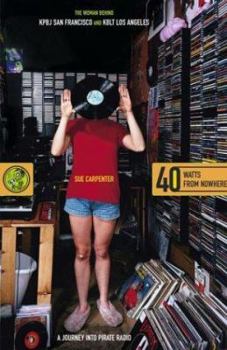40 Watts from Nowhere: A Journey Into Pirate Radio
Select Format
Select Condition 
Book Overview
When law office receptionist Sue Carpenter first asked how she might start her own radio station, everyone laughed. Getting on the air (legitimately) in San Francisco was a multimillion-dollar... This description may be from another edition of this product.
Format:Hardcover
Language:English
ISBN:0743229886
ISBN13:9780743229883
Release Date:February 2004
Publisher:Scribner Book Company
Length:225 Pages
Weight:0.85 lbs.
Dimensions:0.8" x 5.8" x 8.7"
Customer Reviews
4 ratings
nice slice of radio life
Published by Thriftbooks.com User , 18 years ago
I liked this book because it felt like a slice of life about living in L.A./Silverlake in the 1990's and being in the music & college radio scene. Personally knowing some of the characters, going to one of the benefit shows, listening to the station & the bands mentioned, being involved in L.A. college radio in the 90's reminds me of a time that has quickly passed. Too bad it went under, but nothing good lasts forever. A fun read. Definitely not a "how to" cookbook, but great insights into personal media broadcasting before the crest of the great tidal wave.
How this book kicks ass, and other pirate booty...
Published by Thriftbooks.com User , 20 years ago
I HATE cryptic reviews so i thought i would add my own 2 cents. I loved this book! The author comes across as so honest and forthright that you feel like you are in her inner circle while the story unfolds. The story is funny, tragic, and all too real if you live in L.A. Who would have thought that running a pirate radio station would be sooo much work? I love the idea that one person (with the help of some friends) could make all of this happen. It's a very empowering story. Quite honestly, i couldn't put it down.
Highly principled music fanatic
Published by Thriftbooks.com User , 20 years ago
I read a blurb on this book in Rolling Stone last week and bought the book the next day. I read the entire thing in one 9-hour sitting.It tells an interesting story about a cat-and-mouse game with the FCC, but more importantly, one person's drive to create a true alternative radio station where the DJs have total control over what they play. Ironically, before creating her pirate radio stations, the author wasn't actually a huge alternative music fan and mentions attracting all sorts of semi-famous musicians to the station,without being all that steeped in their music. Clearly, this woman was unpretentious. She mentions the sacirfices she made to keep the station going.There's a blatant honesty to this story that just kept me reading. If you're a fan of alternative (oooh! there's those incredibly overused word again) music and sub-culture, then this is for you. If Celine Dion is more your cup of tea, then you may not appreciate why she bothered in the first place to risk jail in order to liberate the airways, even if it was for the benefit of a small radius of listeners around her house.
Who owns the air?
Published by Thriftbooks.com User , 20 years ago
40 Watts From Nowhere is a human interest story where the protagonist loses the game, but still gets a lovely consolation prize- the experience of having created a thriving community. A loyal following consisting of the media, musicians, and like-minded individuals, simply by providing music to a small core of ravenous music lovers. The only problem? It was against the law. The FCC caught up with 'Paige Jarrett' and put a stop to her unauthorized distribution of free music. No, this is not the story of yet another copyright infringing youth downloading music for free from the internet. This is the unusual success story of low-power, Pirate Radio in one of America's largest cities- Los Angeles.In an attempt at curbing the boredom of a 9 to 5 job as a receptionist, Sue Carpenter decided to purchase a small transmitter and set up shop in her apartment, eventually enlisting a small army of 25 or so volunteer disc jockeys playing everything from folk to punk. Pirate radio, notorious for broadcasting radical fringe political views is an unusual forum for music Carpenter discovered as she enlisted the help of many of the radio underground's key players for technical advice.For nearly 3 years, KBLT (yes, named for the sandwich), operated freely, almost so publicly that they would enlist artists such as Mazzy Star for a benefit concert, host Red Hot Chili Peppers for an in-studio impromptu performance, and even gain the services of punk rock legend Mike Watt to do his own KBLT radio program. Eventually, this cavalier attitude and a more powerful antenna location would spell KBLT's demise, being shut down permanently by the FCC.This story will delight anyone, such as myself who have worked in radio outside of the commercial realm. People who understand the power of music on its own terms, without playlists and big money commercial programming or rules. KBLT had the spirit of good College Radio, only without the college to go along with it. Anybody who lives on the left end of the dial will understand. Should anyone but the people themselves own the airwaves? In a country that brags of free speech, it's an interesting question...





